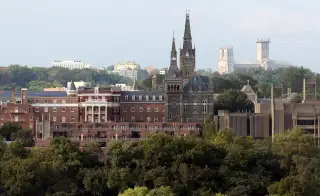What Nobody's Saying About Georgetown's Move to Aid the Descendants of Slaves

Georgetown University's announcement yesterday that it will try to atone for its ties to slavery by giving descendants of those slaves the same admissions preference as the descendants of alumni is just the latest tear in the veil that has hidden centuries of admissions preferences, say those who’ve studied the issue.
In fact, admissions policies at in-demand colleges are a mass of conflicting priorities and preferences, note experts such as Princeton sociologist Thomas Espinshade. "Admission to elite colleges and universities in the United States is not now and never has been based solely on academic merit,” he concluded in a ground-breaking study on the topic.
Espinshade observed that the preferences given some racial groups attracted much more controversy than those accorded, say, the wealthy. "Elite colleges and universities extend preferences to many types of students, yet affirmative action—the only preference given to underrepresented minority applicants—is the one surrounded by the most controversy," he wrote.
Espinshade found that African-Americans were one group (of many) that elite colleges appeared to accept with lower test scores. But he also found that the admissions preferences for African-Americans had been declining over time, while advantages for others, such as athletes, had been rising.
Despite affirmative action, African-Americans, who make up 12% of the U.S. population, are still significantly underrepresented at elite colleges.
A Money analysis of the 52 elite colleges that reject at least 75% of their applicants finds that African-Americans make up only 5% of the undergraduate population. At Georgetown, which rejected 83% of applicants in 2014, only 6% of the student body is African-American.
Part of that is because of a long history of discrimination at many elite colleges. Princeton, for example, enrolled its first African-American undergraduate in 1942— because the Navy opened a wartime training center on the campus and happened to assign three African-American students there.
Espinshade and other researchers have found evidence of a host of other preferences, many to the benefit of the already-advantaged, including:
- “Legacy” status. More than 70% of selective colleges give an admissions edge to children of alumni, one study reported. Since many of those schools discriminated against minorities in the past, the practical result can be extra edge for the children of the privileged. Georgetown "provides care and respect for those members of our community—faculty, staff, and alumni—who have had a long and enduring relationship with the university. These applicants receive an extra look and relationship to the university is one of many factors considered, but is not determinative. We will provide this care and respect for the descendants," Georgetown spokeswoman Rachel Pugh told Money.
- Ability to pay. Growing numbers of elite colleges are giving admissions advantages to students who don’t need financial aid. Haverford, for example, announced this summer it would employ “need-aware” admissions policies, joining schools such as Wesleyan, Reed, and Smith. For its part, Georgetown says it is one of just 28 private colleges in the country that provide enough financial aid to meet the full needs of all admitted students and that it does not consider need for aid in admissions.
- Power and influence. A series of scandals at flagship public universities, such as the University of Illinois and the University of Texas, revealed that officials at those schools were giving admissions preferences to the children of powerful politicians and businesspeople.
- Athletic prowess. Espinshade found that top athletes accepted into elite colleges typically had SAT scores about 200 points below those of other accepted students.